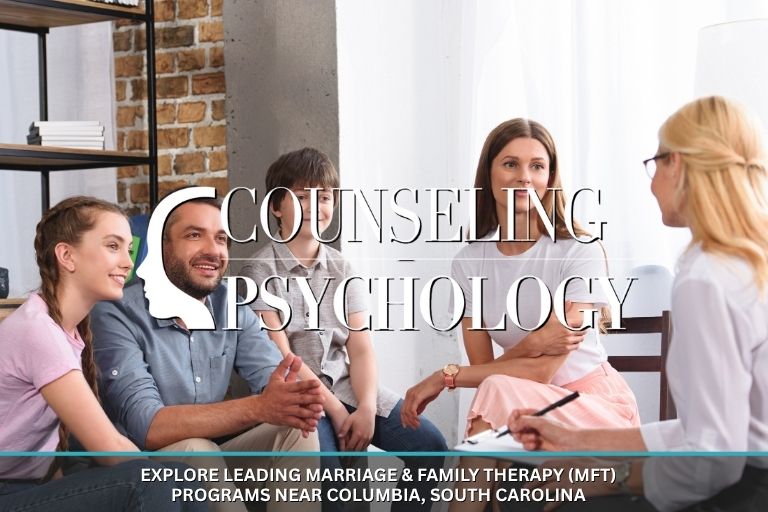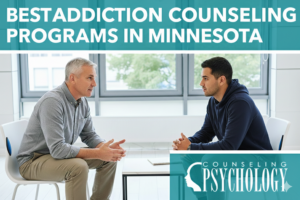Explore Leading Marriage & Family Therapy (MFT) Programs Near Columbia, South Carolina

As the demand for relationship-focused mental health professionals grows, marriage and family therapy (MFT) has emerged as one of the most impactful specialties in the behavioral health field. In Columbia, South Carolina, students interested in pursuing MFT credentials benefit from a combination of high-quality academic programs, affordable living, and access to diverse practicum opportunities.
According to the U.S. Bureau of Labor Statistics, employment for marriage and family therapists is projected to grow 15% through 2032—much faster than the national average for all occupations. The need for licensed therapists is especially strong in regions like South Carolina, where rural and urban communities alike are working to expand access to family-centered mental health care.
This guide explores top MFT programs in and around Columbia, South Carolina, highlighting graduate pathways, accreditation, clinical training options, and career outcomes. Whether beginning a new chapter or advancing an existing practice, students will find that Columbia offers strong foundations for professional success.
2026 Leading Marriage & Family Therapy (MFT) Programs Near Columbia, South Carolina
Columbia International University
Columbia, SC - Private 4-year - ciu.edu
Master's - Postgraduate Certificate in Marriage & Family Counseling
Online Learning - Visit Website
Columbia International University's Postgraduate Certificate in Marriage & Family Counseling delivers specialized training for mental health professionals seeking advanced therapeutic skills. The online program uniquely integrates biblical perspectives with contemporary counseling techniques, preparing students for state licensing as therapist interns. Coursework emphasizes comprehensive family systems understanding, equipping graduates to effectively counsel diverse populations including couples, children, and adolescents. Students gain practical intervention strategies and develop sophisticated clinical insights through a curriculum designed to address complex family dynamics and mental health challenges. The program stands out for its holistic approach to therapeutic education, blending theoretical knowledge with practical application.
- Postgraduate Certificate Available
- Advanced Counseling Training
- State Licensing Preparation
- Focuses on Families/Couples
- Biblical Counseling Perspective
The Value of Studying MFT in Columbia, South Carolina
Columbia is more than South Carolina's capital, it's a hub for health care, higher education, and public service. The city is home to a wide range of counseling agencies, medical centers, and nonprofit organizations that partner with local universities for student internships and clinical placements. With a population of over 137,000 and proximity to both rural and metropolitan populations, Columbia offers a diverse and dynamic training environment for aspiring MFTs.
In addition, South Carolina has invested in expanding behavioral health services, particularly in underserved regions. Students in MFT programs often benefit from state mental health initiatives and employer-sponsored internships that support pathways to licensure and post-graduation employment.
Columbia's central location makes it especially convenient for those seeking placements across the Midlands region. From hospital settings in downtown Columbia to school-based roles in Lexington and Richland Counties, the variety of populations served creates a well-rounded clinical experience for graduate students.
Practicum & Clinical Training Opportunities
Real-world experience is a cornerstone of effective MFT education. Practicum and internship placements allow students to apply evidence-based approaches in actual therapeutic settings while receiving supervision from licensed clinicians.
Students in programs near Columbia benefit from partnerships with:
- Palmetto Health-USC Medical Group
- Lexington Medical Center
- Richland County School Districts
- South Carolina Department of Mental Health
- Local nonprofit organizations and private therapy practices
These placements allow students to apply therapeutic techniques in diverse settings, including outpatient clinics, community health centers, and integrated care teams. Some programs also offer in-house training clinics supervised by licensed faculty, which simulate private practice and agency environments.
A recent graduate from one Columbia-based program completed internship hours at a nonprofit that serves families navigating divorce and custody transitions. This hands-on exposure to family dynamics, trauma-informed care, and multi-system coordination became a springboard for full-time employment after graduation.
Key Coursework Areas
Academic coursework in MFT programs provides the theoretical framework and clinical techniques needed to work effectively with individuals, couples, and families. Courses also prepare students to navigate licensure exams and ethical challenges in the field.
Each MFT program structures its curriculum differently, but most cover these core content areas:
- Human Development Across the Lifespan: Examines emotional, cognitive, and social development from infancy through late adulthood. Emphasis is placed on understanding life transitions, attachment styles, and the impact of developmental stages on relational patterns.
- Couple and Family Systems Theory: Focuses on the interconnected nature of family relationships. Topics include systems thinking, communication patterns, boundaries, family roles, and the influence of generational dynamics on behavior.
- Assessment and Diagnosis in MFT: Trains students to conduct clinical assessments and formulate diagnoses using DSM-5 and systemic conceptualizations. This course also covers case conceptualization, treatment planning, and collaborative goal-setting.
- Multicultural and Diversity Issues in Therapy: Prepares students to deliver culturally responsive care. Topics include racial and ethnic identity, socioeconomic factors, gender and sexuality, and working with marginalized populations through an intersectional lens.
- Legal, Ethical, and Professional Standards: Reviews legal statutes, ethical codes (e.g., AAMFT), and professional boundaries. Students explore informed consent, confidentiality, mandated reporting, and ethical dilemmas specific to MFT practice.
- Research Methods and Program Evaluation: Introduces qualitative and quantitative research design, data analysis, and evidence-based practice. Students learn how to critically evaluate research literature and measure treatment outcomes in clinical settings.
In addition to traditional coursework, many programs incorporate role-playing exercises, case studies, and live observation opportunities. These methods help bridge theory and practice while enhancing cultural competence and communication skills.
Students also complete 500+ hours of supervised clinical experience as part of their degree requirements. Coursework and clinical work together prepare graduates to sit for the national MFT exam and meet licensure criteria in South Carolina.
Career Outlook and Licensing in South Carolina
Demand for licensed therapists continues to grow across South Carolina, particularly in areas lacking sufficient behavioral health coverage. In Columbia, many employers actively seek LMFTs to support veteran services, school-based programs, and collaborative care teams.
To become a Licensed Marriage and Family Therapist (LMFT) in South Carolina, graduates must:
- Complete a qualifying MFT master's degree or MFT doctoral degree
- Accrue 1,500 hours of supervised post-degree clinical experience
- Pass the national MFT examination
- Apply through the South Carolina Board of Examiners for Licensure
Graduates may work in a variety of settings:
| Employment Setting | Common Roles & Responsibilities |
| Private Practice | Individual, couple, and family therapy |
| Schools | Counseling and family support for K–12 students |
| Hospitals & Clinics | Integrated behavioral health teams |
| Military/Veterans Services | Trauma-informed care for service members and families |
| Nonprofits & Agencies | Family preservation, crisis response, parenting support |
Many professionals also choose to pursue additional credentials in trauma therapy, substance use, or sex therapy to increase their specialization and marketability. See other therapy careers for more information.
Take the First Step Toward a Career in Family Therapy
For those called to support relationships, strengthen families, and promote mental wellness, MFT programs near Columbia offer strong preparation and meaningful community connections. Begin by attending an info session, exploring application deadlines, or reaching out to faculty at the institutions listed above.
Exploring practicum partnerships and speaking with program alumni can also provide insight into post-graduation employment pathways. Some local programs publish annual licensure exam pass rates and job placement statistics—use this data to assess program performance and outcomes.
South Carolina’s continued investment in mental health and Columbia’s academic infrastructure make this region an ideal place to train, grow, and serve as a licensed therapist. With dedication, supervised experience, and evidence-based training, aspiring MFTs can enroll in a South Carolina MFT program and build a rewarding and impactful career helping families thrive.
Sources
- U.S. Bureau of Labor Statistics – Marriage and Family Therapists
- South Carolina Board of Examiners for Licensure
- South Carolina Department of Mental Health
- Commission on Accreditation for Marriage and Family Therapy Education (COAMFTE)



